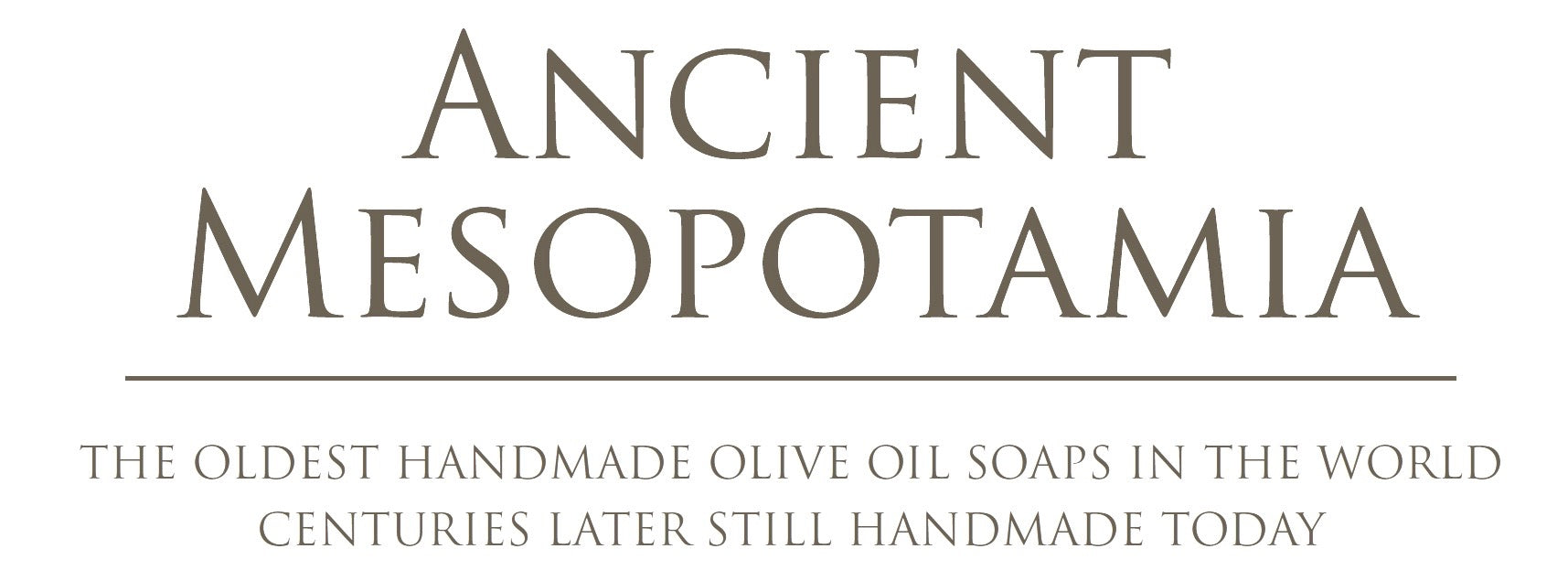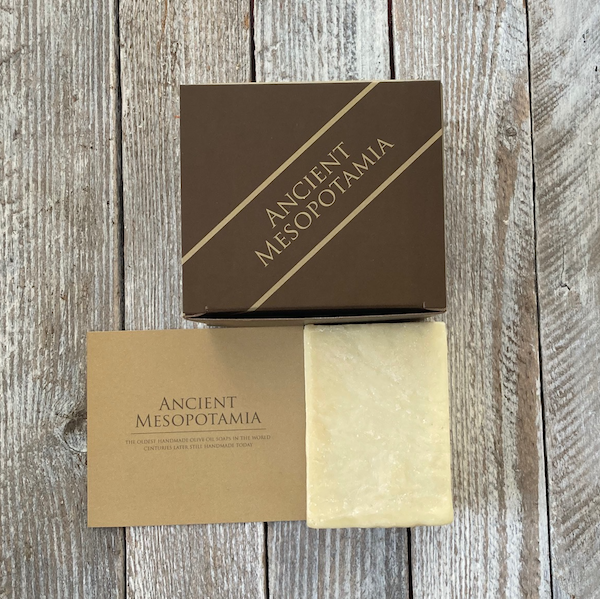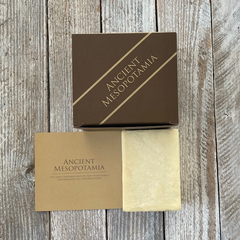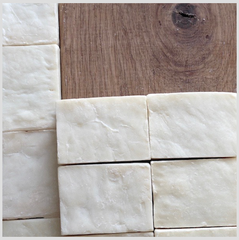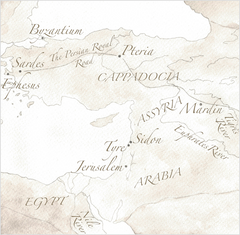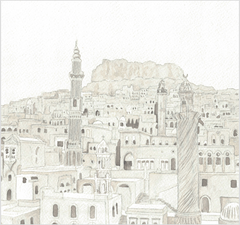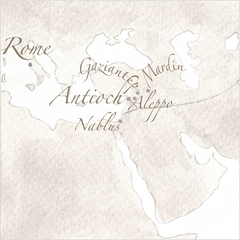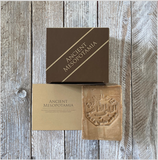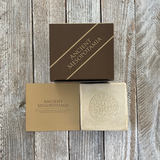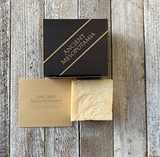Mardin Soap 35% Pure Almond Oil 150g Handmade in Mardin, The Near East : The Untold Story of Soap.
Restocking Shortly
MARDIN SOAP 35% Almond Oil : Mardin, located on The Silk Route, The Persian Royal Road, 4500 BCE : Subartus, Hurrians, Elamites, Sumerians, Akkadians, Hittites, Babylonians, Mitannis, Assyrians, Persians, Romans, Byzantines.
Delivering messages, system of Governors, Satraps, circulating royal decrees, Susa (ancient capital of Persia) - Sardes (Important, wealthy City of The Near East), Darius 1, 522-486 BCE, Horses from The Royal Stables, The Kings Pirradazis (horse changing), Angareion (horse posting), Angarium (riders), in relays 24 hours each 1,677 miles, 111 stations (caravanserai) on the heavily guarded Persian Royal Road, for others who travelled on these routes the penalty was death, 7-9 days or, 3 months on foot. First postal system of the world.
MARDIN, the oldest City in Upper Mesopotamia. Humans have existed for 11,500 years (Unesco World Heritage Site Göbekli Tepe, Upper Mesopotamia). Mardin with a four thousand five hundred BCE history, a Unesco Tentative Listing; the open museum, 40 centuries of soapmaking. Emperor Justinian 1st 527-565 CE, Wife Theodora, Empress, ruled with Justinian 1st for 21 years, a woman from a poor background, Justinian 1st passed a law allowing intermarriage between social classes, his marriage to Theodora caused a scandal but, she became one of the most influential women of the Ancient World.The earthquake of earthquakes 526 CE Antioch, Theodora ensured the fine Church of St. Michael and The Basilica of Asterius were rebuilt despatching marble columns from Constantinople.
The Province of Mardin Dara, three miles from the Persian border of Nisibis Justinian 1st rebuilds and strengthens the last Roman fortress constructing a colonnaded stoa running around the 114 feet tall three storey walls, digging a crescent-shaped moat filled with deep water, irrigating the City, digging a canal for water supply, at the same time diverting its flow to an underground channel, denying water to any enemy. A magnificent arch dam with sluice-gates ensured the waters would never flood the City again.
540 CE, Antioch was sacked and burnt by The Persians but, Emperor Justinian 1st ensured its complete rebuild. Clearing the City from debris : stoas, market place, dividing all the blocks of houses with streets making water channels, fountains, and sewers.He summoned artisans and craftsmen to build making Antioch more than it was before : Theatres, baths, a great church to The Mother of God and the immense church Archangel Michael. Buildings for the poor ( men, women, travellers ) suffering maladies (disease).
The ochre sunset of Mardin, where olive oil, pistachio oil, travelled on The Persian Royal Road, where Persian Sogdian Traders travelled on The Silk Route and spoke the language of Sogdiana for hundreds of years from Chang'an (Han Dynasty), Samarkand to Antioch (The Roman Empire), the preference of King Charles 111, centuries later, soap; still handmade today, from untreated olive and almond trees, producing handmade, hand-cut, 65% pure olive oil and 35% pure almond oil, a natural anti-inflammatory, high in vitamin E, moisturising dry sensitive skin, leaving skin nourished and silky, containing no perfumes, artificial colours or, preservatives. A delicate natural scent. Continuing making history remarkably, from the original historical area, directly from the Soapmakers in Ancient Mardin, Southern Turkey.ANCIENT MESOPOTAMIA : Antiochia Soap, Mardin Soap, Aleppo Soap and Nablus Soap; a collection of the first handmade olive oil, laurel berry oil, pistachio oil & almond oil soaps traded on The Silk Route, all from the area of Ancient Mesopotamia, The Fertile Crescent, used by The Emperors, Kings, Queens, Princesses, Pharaohs and the wealthy, centuries later, still handmade today. 2200 BCE (where oils in soap began, Sumerians), a formula of soap consisting of water, alkali (ash) and cassia oil (cinnamomum) was written on a clay tablet (two thousand years before The Silk Route opened).
ANCIENT MESOPOTAMIA : continuing the ethical and sustainable ethos, the culture and spirit of the first Soapmakers of the world remarkably, 40 centuries later, still handmade today from the original historical areas whilst supporting their families.
SOAP : an ancient product, the greatest medical discovery in human history, cleans away something you cannot see, soap does not attract germs, water does, saves the life of a healthy person oblivious to the bullet they dodged, has saved more lives than penicillin, doesn't just make cities healthier it makes them possible, enabling our existence.
Unexplained telepathy; handbags, Göbekli Tepe, Upper Mesopotamia, a Unesco World Heritage Site : Sumerian handbags, Olmec handbags, Maori handbags, Egyptian handbags, Indian handbags, stone art from the Americas and Australia and handbags at Göbekli Tepe, Upper Mesopotamia, unexplained telepathy, a Unesco World Heritage Site Göbekli Tepe, Upper Mesopotamia, Mesopotamia.
Mardin Soap 35% Almond Oil, history in box, ingredients : Prunus Amygdalus Dulcis oil (Almond oil), Amygdalum Lac (Almond milk) Ancient Mesopotamia products contain no perfumes, artificial colours or, preservatives. Ancient Mesopotamia products are not tested on animals and are 100% biodegradable. 150g ℮.
NOTE : Not suitable if you have a nut Allergy.
